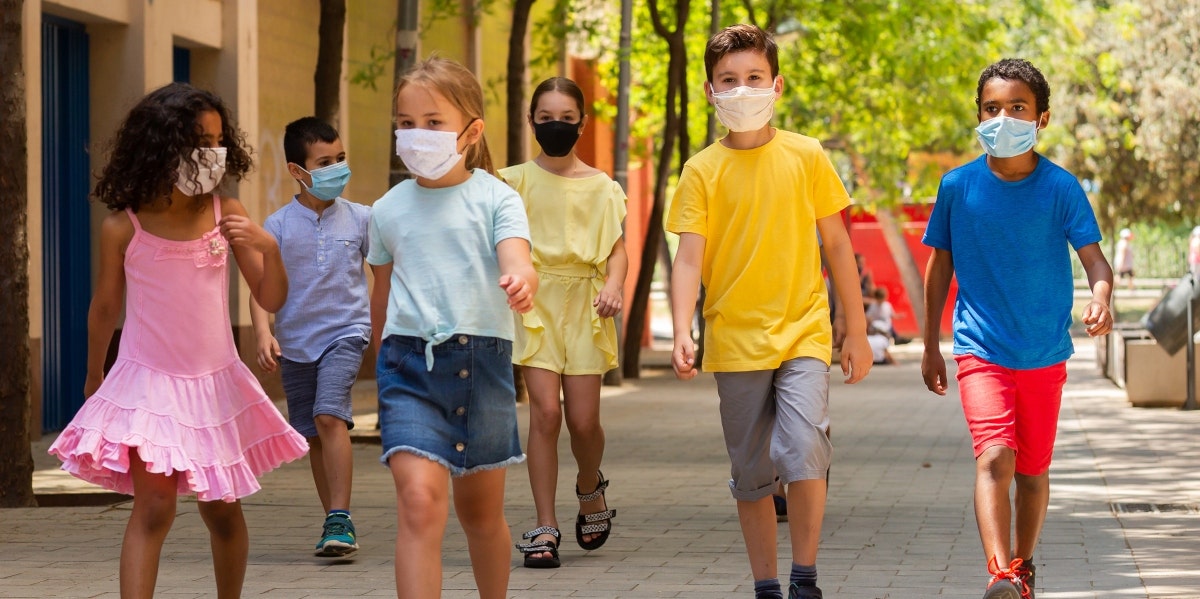7 Ways To Help Kids' Rusty Social Skills As The Pandemic Winds Down
How can you expect your child to assimilate when they haven’t been practicing their social skills?
 Iakov Filimonov/Shutterstock
Iakov Filimonov/Shutterstock Covid-19 had a dire impact on all of our healthy social skills, but especially children. And no one can dismiss the impact rusty social skills have had on all of us.
Calling it a "missed year" is an understatement. How can we expect our children to assimilate into hybrid or in-person learning when they haven’t been practicing their social skills?
What about the child who was shy, introverted, or lonely before Covid? Will life be better or worse for them?
One year of over-indulgence in screens and rusty social skills and now we are to sit back and expect life to be great for them?
Addressing the social and emotional needs of kids as they return to in-person school.
Of course, academics are critical. Yet, we shortchange our children when we discount the importance of social connection.
The American Academy of Pediatrics stated that kids need to return to in-person school this fall.
They recognize the seriousness of Covid and the importance of physical safety, yet, they also recognized the essential value of emotional safety when evaluating overall school safety.
Relationships with peers and adults are invaluable, especially for preschool-aged children who are learning how to share and play with other kids.
Kids get a lot of value out of their personal interactions with other kids. Social life is a key part of growing up at every age level.
As with any other skill, if not practiced and used, social skills become rusty. Younger children need to play to build reciprocal relationships, and teens need to "chill" together.
Being with peers, trying things out, practicing, adapting, and trying again is a key aspect of social learning.
Here are 7 ways to help your kids with healthy social skills as the pandemic winds down.
1. Play games.
Games are an incredibly useful and easy way to teach academic skills as well as social development opportunities.
For younger children, model taking turns and how to handle losing. For older children, help them consider the feelings of others and talk about how to pick out a game someone else might like to play.
2. Go on a hike.
Help children explore their inner thinking while exploring the outdoors.
What do they hear? Taking the time to truly listen will improve their ability to pause and hear what others say.
Build empathy skills by discussing their thoughts and feelings. Why are they feeling that way? What can they do to make it better?
3. Reconnect with friends before school.
Many kids will have gotten both vaccines, so enjoying time with friends will be easier.
A few playdates with friends your child knows, socially distanced if required, will provide comfort to an anxious child.
4. Read a book together.
Find a book about a social dilemma and discuss the story together.
Why was the main character angry or sad? What happened that made that character react in a bad way?
5. Create a back-to-school plan with your child.
Uncertainty can lead to anxiety. Prepare your child before they return to school on the expectations of what masks, social distancing, lunch, recess, etc. might look like.
Depending on the age of your child, a big change can cause some anxiety that they may not know how to manage. Ask them what their concerns are and what they are most looking forward to when the new school year begins.
6. Create a visual calendar.
Help your child understand when he will be returning to school. Create a calendar with photos from last year showing the fun he had with teachers and classmates.
Maybe there was a field trip or class party picture you can include to show how much fun was had at school.
7. Empathize and validate their feelings before trying to fix them.
It's so important for your children to feel like they are being heard. There's a lot of pressure on them right now — the need to keep up with academics, fit in socially, and some may even be working through their feelings and fear of losing a family member to Covid.
Your child may not know the best way to express their worries. If they show resistance in returning to school, acknowledge and empathize with her feelings before jumping in to reassure him that everything will be fine.
Social Interactions are critical at all ages of development.
After a year of remote learning and limited engagements for our children, they are struggling.
Taking part in just a few activities a week can really support their social growth and get them feeling more comfortable, and socially ready to join the classroom in person this fall.
Caroline Maguire, ACCG, PCC, M.Ed. is a personal coach who works with children with ADHD and the families who support them. For more information, visit her website.
